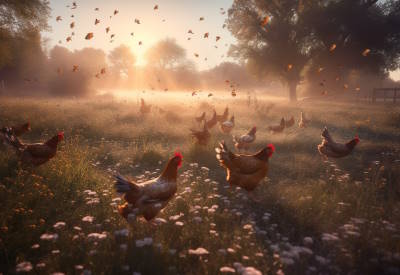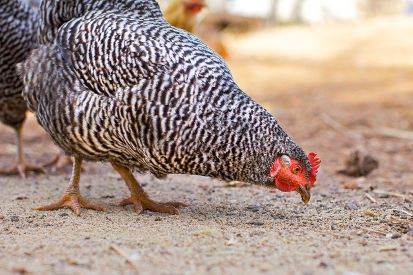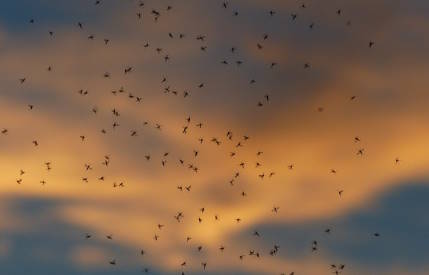Do chickens eat bees? If you’ve ever asked yourself this question while watching your feathered friends forage in the backyard, you’re not alone. As an avid chicken keeper, I’ve pondered the same question. As it turns out, the answer is quite surprising: yes, chickens can and do eat bees!
This unexpected dietary choice of chickens has various implications, from the nutritional aspect to the potential impact on local bee populations. It’s a topic worth exploring, particularly for those who raise chickens or are interested in their feeding habits.
This article delves into the unusual relationship between chickens and bees. We’ll discuss the factors influencing this behavior, assess its benefits and risks, and provide practical advice for chicken owners. Let’s unravel the intricacies of this fascinating aspect of chicken behavior.

Understanding Chickens’ Dietary Preferences
Chickens, by nature, are not fussy eaters. As omnivores, their diet includes a wide variety of foods ranging from plants to insects and everything in between. In this section, we’ll explore the dietary preferences of chickens to understand their feeding habits better.
Overview of Chickens’ Natural Diet
If you’ve ever observed a flock of backyard chickens, you’ll quickly realize that they are not particularly picky eaters. From seeds, grains, and greens to insects, worms, and even small rodents, chickens are the ultimate omnivores.
The Omnivorous Nature of Chickens
Chickens are gifted with a wide-ranging diet, allowing them to consume many food items that come their way. Their strong beaks and sharp eyes help them forage for everything from juicy tomatoes to crunchy beetles. Their diet is a testament to their survival skills.
Chickens’ Insect Consumption Habits
Insects are a favorite amongst chickens. They’re a high-protein snack that chickens relish, and their foraging instinct often leads them to hunt these critters. But does this insect love extend to bees? Let’s find out.
[ChickenAffiliate]
Chickens and Bees: A Complex Relationship
Now, you might be thinking, do chickens really eat bees? Well, the answer is yes. With their innate curiosity and hunger for protein, chickens often find bees to be a tempting snack. However, the relationship between chickens and bees is more complex than it might seem.
Instances of Chickens Eating Bees
It might surprise you, but chickens can and do eat bees. When bees buzz around their coop or in their run, chickens see them as a potential meal. They’re quick and efficient, snatching bees out of the air with a swift peck.
Factors Influencing Chickens’ Bee Eating Behavior
Not all chickens will snack on bees, though. It depends on the chicken’s breed, age, personality, and previous experiences. Some chickens are more adventurous eaters, while others may shy away after a sting to the beak.
Implications of Chickens Eating Bees
While chickens eating bees may seem concerning, it’s not necessarily bad. Chickens can help control bee populations, especially in areas where bees have become a nuisance. But there’s more to this story.
The Nutritional Impact of Bees on Chickens

As with any food, there are potential benefits and risks associated with chickens eating bees.
Nutrient Composition of Bees
Bees pack a nutritional punch. They are rich in protein, essential for a chicken’s growth, egg production, and overall health. They also provide small amounts of other nutrients like fats and vitamins.
Potential Risks to Chickens
While bees can provide a protein boost, they also come with a risk – the sting. Most chickens handle bee stings with no problem, but some may have allergic reactions. Always keep a close eye on your feathered friends if they seem to have a taste for bees.
Comparisons with Other Protein Sources
Compared to other protein sources like mealworms or commercial feeds, bees are not the most efficient. They’re harder to catch and carry the risk of stings. So, while they can be a part of a chicken’s diet, they shouldn’t be the only source of protein.
The Potential Impact on Bee Populations

While chickens might enjoy a bee snack, the implications of their bee-eating habits on local bee populations can be significant. Bees, both honey bees and native species, play a vital role in our ecosystems, primarily through pollination. Here, we’ll explore how chickens’ dietary habits might affect bee populations and the broader environmental implications.
Effects of Chickens on Local Bee Populations
Chickens can impact local bee populations, especially if they develop a taste for them. However, unless you have a significant number of chickens in a small area with a limited bee population, this is unlikely to cause a significant decline.
Role of Chickens in Pest Control: Bee Predation as a Double-Edged Sword
Chickens can play a role in controlling pests, including bees. However, indiscriminate predation can also harm beneficial insects and disrupt the balance of your local ecosystem. It’s a delicate balance that needs careful management.
Conservation Concerns: Honeybees, Native Bees, and Chickens
While chickens eating pest bees can be beneficial, they can’t distinguish between these and honeybees or native bees. This can be problematic as these bee species play crucial roles in pollination and are already facing numerous threats.
Methods to Control Chickens’ Bee-Eating Habits

If you’re a chicken owner worried about your flock’s bee-eating habits, there are steps you can take to discourage this behavior. Modifying their environment and diet can influence your chickens’ choice to snack.
Creating a Chicken-Friendly Garden that Discourages Bee-Eating
One way to discourage chickens from eating bees is by creating a garden that keeps both parties happy but separate. Plant chicken-friendly plants on one side and bee-attracting plants on the other side. This way, your chickens get their greens, and your bees get their pollen, with some distance in between.
Alternatives to Bees as Protein Sources for Chickens
If your chickens have a taste for bees, consider introducing other protein sources into their diet. Mealworms, for example, are a high-protein snack that chickens love. Commercially prepared chicken feeds also contain an optimal mix of nutrients, including protein.
Training and Behavior Modification Techniques
While it might seem daunting, you can train chickens to avoid certain behaviors, including eating bees. Using techniques like positive reinforcement, you can steer your chickens away from bees and towards safer food options.
Case Studies and Expert Opinions
Nothing beats real-life experiences and expert advice when trying to understand an unusual behavior like chickens eating bees. By exploring personal anecdotes, scientific studies, and expert opinions, we can comprehensively understand this peculiar habit.
Personal Experiences of Poultry Keepers
Many poultry keepers have observed their chickens chasing and eating bees. Some report their chickens showing no adverse effects, while others note mild reactions to bee stings. There’s a spectrum of experiences reinforcing the complexity of the chicken-bee relationship.
Scientific Studies on Chickens and Bee Interactions
While there’s not a vast body of scientific research on chickens eating bees, studies on chicken diets and behaviors provide valuable insights. These studies confirm chickens’ omnivorous nature and ability to adapt their diet based on available food sources.
Expert Opinions on the Pros and Cons of Chickens Eating Bees
Experts generally agree that while chickens can eat bees, it’s not something to encourage due to the risks and potential ecological impact. They recommend providing a varied diet for chickens that includes safe and nutritious alternatives to bees.
What Other Insects Can Chickens Eat Apart from Bees?

While bees might be on the menu for our feathered friends, they’re certainly not the only insects that chickens enjoy. Many other creepy crawlies form part of their diverse insectivorous diet. Let’s delve into other insects your chickens might be snacking on.
Ticks
Chickens are often used as a natural pest control method, and ticks are no exception. Chickens will gladly gobble up these little pests, reducing the tick population in your yard. This is beneficial for the chickens, who get a protein-rich snack, and you and your pets, reducing the risk of tick-borne diseases.
Read More: Do Chickens Eat Ticks? Unveiling Their Role In Pest Control
Mosquitoes
Mosquitoes may be a nuisance to us, but they’re another protein source for chickens. Chickens can snap up mosquitoes in flight, decreasing the population of these annoying insects. This is another win-win situation, with chickens enjoying a nutritious meal and you enjoying fewer mosquito bites!
Read More: Do Chickens Eat Mosquitoes? Surprising Benefits Revealed
Maggots
While maggots might make us squirm, chickens see them as a delicious meal. Maggots are a great protein supplement to a chicken’s diet, especially if they’re laying eggs. You’ll often see chickens scratching around in compost heaps or rotten logs, looking for these wriggly morsels.
Read More: Do Chickens Eat Maggots? Unveiling The Surprising Benefits
Fleas
Fleas are another pest that chickens can help control. Chickens will peck at and consume fleas they come across in the environment, which can help keep flea populations under control. This reduces the risk of flea infestations in your pets or around your home.
Read More: Do Chickens Eat Fleas? Your Backyard’s Secret Pest Patrol
Flies
Flies, like bees, can be snatched right out of the air by a hungry chicken. These insects are yet another source of protein that chickens won’t hesitate to take advantage of. By reducing the number of flies, chickens can help make your outdoor spaces more enjoyable for you while ensuring they get a balanced diet.
Read More: Do Chickens Eat Flies? Uncovering The Fascinating Truth
Do chickens eat bees – final thoughts
So there you have it – the curious case of chickens and bees! Who would have thought that our feathery backyard companions could develop a taste for these buzzing pollinators? Chickens, with their eclectic culinary preferences, never cease to surprise us. They view bees not only as buzzing nuisances but also as a tasty, protein-packed treat.
We’ve journeyed through the complex relationship between chickens and bees, exploring everything from the nutritional pros and cons to the broader environmental implications. So next time you see your hens chasing after a bee in your garden, remember – it’s just another chapter in the fascinating saga of the chicken diet.
Related Articles:
